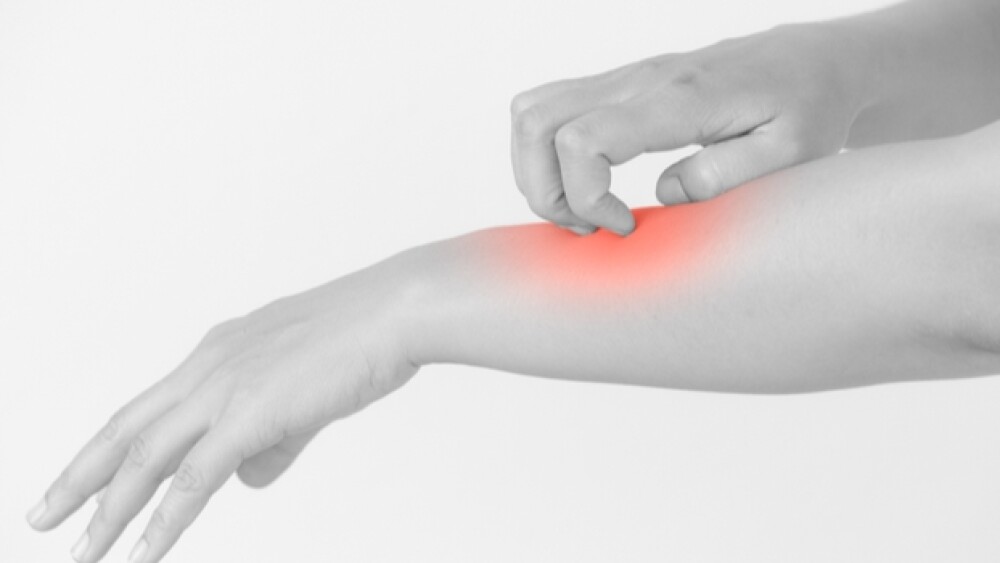The drug met all the co-primary and key secondary endpoints related to skin clearance and itch relief compared to placebo.
Pfizer announced results from its Phase III clinical trial, JADE MONO-1, of abrocitinib in moderate to severe atopic dermatitis. The drug met all the co-primary and key secondary endpoints related to skin clearance and itch relief compared to placebo.
Abrocitinib is an investigational oral Janus kinase 1 (JAK1) inhibitor. The data was presented at the 28th Congress of the European Academy of Dermatology and Venereology (EADV) this weekend in Madrid, Spain.
The JADE MONO-1 trial was a 12-week study looking at 387 patients with two dosing levels of abrocitinib, 200 mg and 100mg, or placebo. The patients completed 12 weeks of treatment and had the option of participating in a long-term extension (LTE) study, B7451015. Any patients who discontinued early from treatment or who couldn’t otherwise participate in the LTE trial participated in a four-week follow-up period.
The co-primary endpoints were the proportion of patients who hit an Investigator Global Assessment (IGA) score of clear (0) or almost clear (1) skin with a two-point or greater improvement compared to baseline. The second part was the proportion of patients who managed a 75% or better change from baseline in their Eczema Area and Severity Index (EASI) score.
Key secondary endpoints included the proportion of patients who hit a four-point or bigger decrease in itch severity. This was measured by the pruritus numerical rating scale (NRS) and the magnitude of decrease in the Pruritus and Symptoms Assessment for Atopic Dermatitis (PSAAD). The PSAAD is a patient-reported scale that Pfizer developed.
Additional secondary endpoints included the proportion of patients who had a 90% or better change in EASI score, and the percentage change in their SCORing Atopic Dermatitis (SCORAD) response at specific scheduled periods.
Both doses of the drug significantly improved both the IGA and EASI-75 dose response outcomes compared to placebo. The changes in SCORAD were also significantly better at the scheduled investigation points for both doses compared to placebo.
“There is a critical need for additional treatment options for patients living with moderate to severe atopic dermatitis,” said Michael Corbo, chief development officer, Inflammation & Immunology, Pfizer Global Product Development. “We are pleased by these findings, which together with the recently reported positive top-line results from our Phase III trial, encourage us that, if approved, abrocitinib may provide the first oral, once-daily treatment option for these patients.”
If the drug is approved, it will have to compete with Sanofi and Regeneron Pharmaceutical’s Dupixent (dupilumab). Dupixent’s net sales for the second quarter of this year were $557 million, an increase of 166% from the same period in 2018, exceeding analysts’ expectations by more than $100 million. It was approved in March 2017 for eczema but had gained additional label approvals since then. Dupixent and abrocitinib have different modes of action.
In the Pfizer trial, 20.1% of patients receiving the high-dose of the drug experienced short-lasting nausea. The most common adverse events in the group after nausea was nasopharyngitis, 11.7%, and headache, 9.7%.
“The goal is really to be able to highlight the onset of action, the magnitude of the response, both of which are really important to the patients, focusing both on the inflammation as well as the pruritus,” Corbo said. “That’s how we view the uniqueness of the molecule.”
Pfizer is currently finishing a third Phase III trial that compares abrocitinib directly against Dupixent. Data is expected in the first half of 2020 and then the data from all three trials will be used to file with regulators in 2020.





